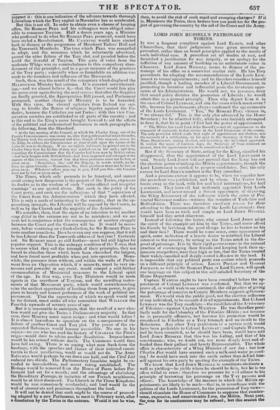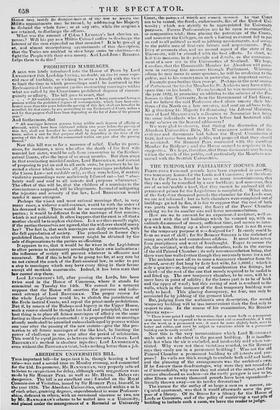LORD JOHN RUSSELL'S PATRONAGE OF TORI F.S.
IT was a frequent complaint against Lord ELDON, and other Chancellors, that their judgments were given according to precedent, rather than on broad principles applied to the merits of' each individual case. A precedent set all doubts at rest, and furnished a justification for any iniquity, or an apology for the infliction of any amount of hardship on an unfortunate suitor in Chancery. Lord JOHN RUSSELL seems to dispose of the pa- tronage of his office on a somewhat similar rule. He has Tory precedents for adopting the recommendations of the Lords Lieu- tenant to vacant appointments; and he therefore considers himself Justified, though a leading member of a Liberal Government, in promoting to lucrative and influential posts the inveterate oppo- nents of his Administration. He would not, we presume, deny that sound policy dictates the promotion of Liberals ; be would admit this as a general principle. Then why depart from it in the case of Colonel LINDSAY, and sin ilar cases which must occur? Oh, because his predecessors always confirmed the apt ointments of the Lords Lieutenant. " Yes," Sir ROBERT PEEL chimes in, " we always did." This is the only plea advanced by the Home Secretary; for he admitted fully, while he very foolishly attempted to deny it, that he in point cf fact had the power of appointment.
" The Militia law (said Lord John Russell) vested all appointments to the command of regiments in that service in the Lord Lieutenant of the county. The only provision which made that right of appointment not absolute, was the necessity of a notification, on his past to the Secretary of State fur the Ilome Department, stating the fact, and describing the individual appointed. If, within the spare of foul teen days, the Secretary of State returned no answer, then the appointment watt to be considered as final."
But if the Secretary of State, acting for the King, signified his disapproval, then the appointment of the Lord Lieutenant is void. Surely Lord JOHN will not pretend that the King has not the.absolute power of making the Militia appointments, though the Lord Lieutenant is entitled to propose candidates. No; the only excuse for Lord JOHN'S conduct is the Tory precedent.
And a precious excuse it appears to be, when we consider how the precedent was established, and by whom. The Tories have
borne sway in the land, with few and brief nrs, for half a century. They have till but uniformly appointed Tory Lords Lieutenant, and never missed a decent opportunity of depriving the Whig Aristocracy of the influence which the &lice of Pro- vincial Governor confers—witness the counties of Yorkshire and Bedfordshire. There was therefore excel'ent reason for their attending to the recommendations of the Lords Lieutenant : they would have been as weak and simple as Lord JOHN RUSSELL himself had they acted otherwise. Instead of fidlowing the letter, why cannot Lord JOHN adopt the spirit of the example set him by the Tories, and never offend his friends by lavishiog the good things he has to bestow on his and their foes ? There would be some sense, some appearance of spirit, some indication of a hearty desire to establish the Liberal interest in the country, by acting as the Tories acted in the dis- posal of patronage. It is by their rigid perseverance in the rational practice of encouraging their friends and keeping back their op- ponents everywhere, were they high or low, that the Tories created their widely-ramified and deeply-rooted loam:nee in the land. It is impossible that any political party can endure which proceeds on a different principle of action. Louts PHILIP and General JACKSON, as well as Sir ROBERT PEEL or Lord Esnom, will speak one language on this subject to the self-satisfied Secretary of the Home Department. Captain WEMYSS ought to have been consulted before the ap- pointment of Colonel LINDSAY was confirmed. Not that we ap- prove of, or would wish to see continued, the old practice of giving the patronage of counties to County Members SLI pporting Govern- meat. We would wish the public good, not the election influence of any individual, to be consulted in all appointments. But Colonel LINDSAY was the Tory candidate—the candidate of the Aristocracy of Fifeshire—against Captain WEMYSS. He was therefore pecu- liarly unfit for the Coloneley of the Fifeshire Militia ; nut because he is personally offensive, but because his promotion would be considered in F-feshire as a Tory triumph and an insult to the Reformers. Any other Tory gentleman of a certain rank would have been preferable to Colonel LINDSAY; and Captain Wsmvss, had he been consulted, as lie should have been, would have told Lord JOHN RUSSELL that this was his feeling, and that of his constituents ; who, we doubt not, are more deeply hurt and of- fended than their gallant and hearty Representative. The whole affair is characteristic of a Whig Minister of our day : but how Charles Fox would have scorned such a milk-and-water proceed- ing ! he would have sunk into the earth rather than defend him- self against his own party by quoting the example of the Tories. We know that Lord JOHN RUSSELL is sometimes obstinate a well as yielding—he yields where he should be firm, but he is too often wilful in error : therefore we presume he will adhere to his principle of bestowing his patronage on the Tery parsons and officers:. The knowledge of the manner in which the Militia ap- pointments are likely to be made—that is, in accordance with the politics of the Lords Lieutenant, for the promotion of Tory views— should stimulate the House of Commons to suppress that cumber- some, expensive, and unserviceable force, the Militia. Next year, the,vote for its continuance may be refused , but this session the }louse tatty testify its disappt,,hait,tt ut the ami to wreeu Militia appointments may be Milted, by aildteseing his kIaje.ty Ito disband the whole force; or at any rate, while the sergeates are retained, to discharge the oil:vers. What was the amount of Gaon i Inintlxv's last election ex- penses? Will his pay as a Militia Colonel stitlire to di-eltarge the Interest of the sum expended on that occasion ? It is by gra•ni g at, and almost monapcliziug ;Iprointments of this clesciiptiine that the Tories are enabled to raise large sums for elertions—to fight the People with their own money. And Lord J on .v Russese 1.elps them to do this!



























 Previous page
Previous page